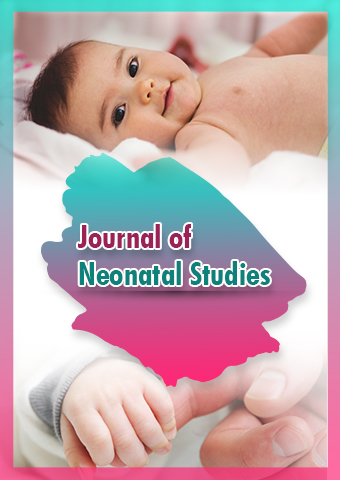Mini Review - Journal of Neonatal Studies (2023) Volume 6, Issue 4
Understanding and Addressing the Unfortunate Reality of Neonatal Cancer
Lakshmi Shankar*
Department of Stem Cell and Research, Martinique
Department of Stem Cell and Research, Martinique
E-mail: shankar@gmail.com
Received: 01-Aug-2023, Manuscript No. jns-23-109492; Editor assigned: 2-Aug-2023, PreQC No. jns-23- 109492(PQ); Reviewed: 15-Aug-2023, QC No. jns-23-109492; Revised: 22-Aug-2023, Manuscript No. jns-23- 109492(R); Published: 29-Aug-2023; DOI: 10.37532/jns.2023.6(4).112-114
Abstract
Neonatal cancer, a rare and devastating condition affecting newborns and infants within their first year of life, poses unique challenges for healthcare providers and families alike. With its occurrence accounting for less than 1 % of all childhood cancers, neonatal cancer remains a relatively underexplored aspect of pediatric oncology. The lack of communication abilities in these young patients further complicates the diagnosis process, often leading to delays and missed opportunities for early intervention. This article delves into the incidence, types, diagnosis, and treatment options available for neonatal cancer, while also highlighting the ongoing research efforts aimed at improving outcomes for these delicate patients. Understanding the complexities surrounding neonatal cancer is crucial in developing comprehensive support systems for families and fostering hope for a brighter future for those touched by this unfortunate reality.
Neonatal cancer • Infant cancer • Congenital cancer • Childhood cancer • Pediatric oncology • Neuro blastoma • Leukemia • Brain tumors • Liver tumors • Soft tissue sarcomas
Introduction
Neonatal cancer, also known as infant or congenital cancer, is a rare and distressing condition where cancer cells develop in newborns, infants, and young children up to the age of one year. This form of cancer is relatively uncommon but presents unique challenges due to the vulnerable age group it affects. Diagnosing and treating neonatal cancer requires specialized knowledge and a multidisciplinary approach involving pediatric oncologists, neonatologists, and other healthcare professionals. Neonatal cancer, an exceptionally rare and heart-wrenching condition, casts a somber shadow over the early days of life for a handful of newborns and infants. While childhood cancer, in general, remains a distressing topic, neonatal cancer stands apart as a particularly challenging and delicate aspect of pediatric oncology. This form of cancer strikes infants within the first year of life, an age when vulnerability and fragility are at their peak [1].
As we explore the world of neonatal cancer, we delve into a realm where the complexities of medical science, the resilience of tiny patients, and the unwavering strength of their families intertwine. This article aims to shed light on the incidence, types, diagnosis, treatment, and the ongoing efforts to support and improve outcomes for those facing the unfortunate reality of neonatal cancer. By understanding the nuances of this condition, we can collectively work towards better addressing its impact and fostering hope for a brighter future [2].
The incidence of neonatal cancer accounts for less than 1% of all childhood cancers, making it an infrequent but significant concern. Due to the limitations in communication abilities of these young patients, diagnosing neonatal cancer can be a formidable task, often leading to delays in initiating treatment. As a result, neonatal cancer presents unique treatment challenges, necessitating specialized care from skilled pediatric oncologists and neonatologists [3].
Throughout this exploration, we will also emphasize the essential role of comprehensive support systems for families affected by neonatal cancer. The emotional, financial, and informational support provided during this trying time can profoundly impact the well-being of both the young patients and their families. In understanding the nuances of neonatal cancer, we can collectively work towards better addressing its impact and fostering hope for a brighter future. By uniting efforts in research, raising awareness, and offering unwavering support, we aim to provide a glimmer of optimism for those touched by this unfortunate reality. Together, we can strive to improve the lives of these precious young patients and their families, ensuring they never face this challenge alone [4].
Discussion
Incidence and types
Neonatal cancer accounts for less than 1% of all childhood cancers. While its occurrence is low, the impact on affected families can be devastating. Various types of cancer can arise in neonates, including neuroblastoma, leukemia, brain tumors, liver tumors, and soft tissue sarcomas. Neuroblastoma is the most common neonatal cancer, affecting the sympathetic nervous system, and typically occurs in infants under the age of six months [5].
Causes and risk factors
The exact causes of neonatal cancer remain largely unknown, as is the case with most cancers. However, researchers have identified some risk factors that may increase the likelihood of a newborn developing cancer. These risk factors include genetic predisposition, exposure to certain environmental toxins, and prenatal exposure to radiation or certain medications [6].
Diagnosis and challenges
Diagnosing neonatal cancer can be particularly challenging due to the limited communication abilities of newborns and infants. Symptoms of neonatal cancer can vary depending on the type and location of the tumor. Common signs may include unexplained weight loss, lethargy, anemia, abnormal growths, and organ enlargement. Unfortunately, these symptoms can be mistaken for other more common infant conditions, delaying the accurate diagnosis of cancer. In some cases, neonatal cancer may be detected during routine prenatal ultrasounds, allowing healthcare providers to prepare for immediate intervention after birth. However, not all tumors are visible during prenatal screening, making postnatal assessments crucial [7].
Treatment options
Treating neonatal cancer presents a significant challenge due to the complexities associated with an infant’s physiology and the potentially limited treatment options for very young patients. Treatment decisions depend on various factors, including the type and stage of the cancer, the overall health of the infant, and the potential side effects of treatments. Surgery, chemotherapy, and radiation therapy are common treatment modalities used in managing neonatal cancer. However, the administration of these treatments in very young patients requires special considerations to minimize long-term adverse effects on their developing bodies [8].
Innovations in neonatal cancer research
The field of neonatal oncology has seen substantial advancements in recent years. Researchers have made progress in understanding the genetic and molecular basis of certain neonatal cancers, paving the way for more targeted therapies. Immunotherapy, a promising treatment approach that harnesses the body’s immune system to fight cancer cells, is also being explored for use in neonatal cancer [9].
Supporting families
A diagnosis of neonatal cancer can be an overwhelming and emotionally draining experience for families. The stress and uncertainty surrounding the health of their newborn can have long-lasting effects on parents and other family members. As such, comprehensive support services that address emotional, financial, and informational needs are essential. Support groups, counseling services, and organizations specializing in pediatric cancer play a crucial role in helping families navigate their journey and connect with others facing similar challenges. These resources offer a safe space for parents to share their experiences, fears, and triumphs, ultimately helping them feel less isolated in their struggles [10].
Conclusion
Neonatal cancer, though rare, presents a complex and heart-wrenching reality for affected families. The challenges associated with diagnosing and treating cancer in newborns demand specialized expertise and a compassionate, multidisciplinary approach from healthcare providers. Continued research and medical advancements hold the promise of improving outcomes for these young patients, offering hope to families facing this difficult journey. Neonatal cancer, a rare and emotionally challenging reality, demands our unwavering attention and compassion.Throughout this exploration of neonatal cancer,we have gained insight into the complexities surrounding its diagnosis, treatment, and the immense toll it takes on affected families. While the incidence of neonatal cancer remains low, its impact on these vulnerable lives is profound, urging us to unite efforts in understanding and addressing this unfortunate condition. Despite the challenges posed by limited communication abilities in infants, advancements in medical research and technology offer hope for improved outcomes. Researchers have made significant strides in understanding the genetic and molecular basis of neonatal cancers, paving the way for more targeted therapies and personalized treatment plans. By embracing a multidimensional approach and offering unwavering support to affected families, we can nurture hope for a brighter future and a world where neonatal cancer becomes a thing of the past. Together, we can make a difference in the lives of these young patients and their families, ensuring that they are never left to face this challenge alone.
Acknowledgement
None
Conflict of Interest
None
References
- Maglaveras N, Stamkopoulos T, Diamantaras K et al. ECG pattern recognition and classification using non-linear transformations and neural networks: a review. Int J Med Inform. 52,191–208 (1998).
- Rajkumar R, Anandakumar K, Bharathi A, et al. Coronary artery disease (CAD) prediction and classification-a survey. Breast Cancer. 90, 945-955 (2006).
- Lee G, Hwang J.A Novel Index to Detect Vegetation in Urban Areas Using UAV-Based Multispectral. Images Appl Sci. 11: 3472 (2021).
- Zou X, Mõttus M. Sensitivity of Common Vegetation Indices to the Canopy Structure of Field Crops. RSE. 9, 994 (2017).
- Vukasinovic.Real Life impact of anesthesia strategy for mechanical thrombectomy on the delay, recanalization and outcome in acute ischemic stroke patients. J Neuroradiol. 95, 391-392 (2019).
- Salinet ASM. Do acute stroke patients develop hypocapnia? A systematic review and meta-analysis. J Neurol Sci. 15, 1005-1010 (2019).
- Jellish WS. General Anesthesia versus conscious sedation for the endovascular treatment of acute ischemic stroke. J Stroke Cerebrovasc Dis. 25, 338-341 (2015).
- Mamdouh N, Khattab A. YOLO-based deep learning framework for olive fruit fly detection and counting. IEEE Access. 9, 84252-84262 (2021).
- Brunelli D, Polonelli T, Benini L. Ultra-low energy pest detection for smart agriculture. IEEE Sens J. 1-4 (2020).
- Suto J. Condling moth monitoring with camera-equipped automated traps: A review. Agric. 12, 1721 (2022).
Indexed at, Google Scholar, Crossref
Indexed at, Google Scholar, Crossref
Indexed at, Google Scholar, Crossref
Indexed at, Google Scholar, Crossref

